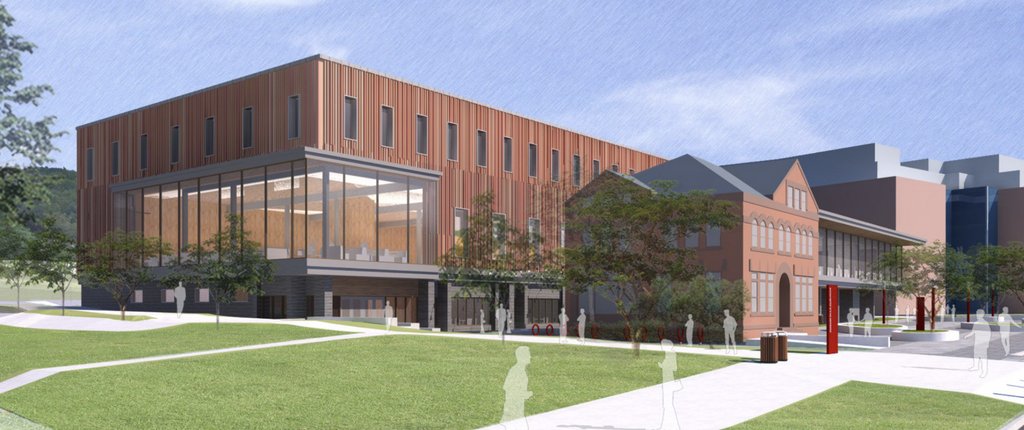Opinion: UMass Amherst Student Trustee Calls For An End To UMass Layoffs And Furloughs

Architect's rendition of new Worcester Dining Commons at UMass. Photo: umass.edu
Editor’s note: This column appeared previously in the Daily Hampshire Gazette.

On a campus that had been suspended in time and silence, students have returned to the University of Massachusetts Amherst for the spring semester. The intensifying COVID-19 crisis has reshaped higher education, pushing college lectures and student events onto zoom as the seasons continue to pass – with no end in sight. While it has only been a week, a rising coronavirus outbreak takes hold at the university.
Notably absent from the campus are the many workers that allow the university to function. While the university operates at limited capacity, hundreds of dining hall employees, maintenance personnel, and other faculty and staff have been placed on indefinite furlough. These workers directly support students’ experiences on campus and their successes. The tireless work of residential hall staff, dining workers, faculty advisors, and more, serves as the foundation of campus activity at the University. The loss of these employees is pronounced by the eerie tranquility of a university which eleven months ago, was bustling with activity. More importantly, the previous furloughs have undermined the financial well-being of those at the university, disproportionately those who are low-income and have families to feed. Similarly, the threat of future furloughs and layoffs alone have the potential to disrupt their mental well-being, which can compound economic insecurity and poverty. As a low-income college student, I attest to the long-term psychological effects of poverty.
As the recently elected Student Trustee at the University, I was elected with the mandate to promote social and economic justice and to elevate the voices and concerns of the marginalized. Having served as a Berkshire Dining student worker, a Resident Assistant, a laboratory dishwasher, among many other jobs as a student at the university, I deeply and personally understand the contributions of university personnel to the students on campus. Having worked beside some of them as a low-income student worker, I do not say this lightly: the many faculty, staff, and student workers who depend on UMass Amherst for financial support have been left vulnerable and in flux. The utter failure of the Commonwealth of Massachusetts to provide sufficient higher education funding sits at the heart of the issue, limiting the University’s ability to support their students and workers. It is this choice which has forced the University to depend on housing, dining, and tuition revenue to function, which has prompted the growing COVID-19 crisis at the university this semester – and the disastrous risks facing understaffed, low income, campus workers.
While I recognize that the State has pushed the UMass system into a box – forcing them to balance their budget by cuts to faculty, staff, and academic programs – alternative funding mechanisms need to be explored to provide emergency support to those who will soon be facing a crisis, in the wake of furloughs and layoffs. The previous decision to indefinitely furlough many employees was made at the projection of a cut in funding for the UMass system and reductions in enrollment, which did not come to fruition. Additionally, even though the State used half of its rainy-day fund, the University has thus far refused to use its own crisis reserves to prevent staff and faculty unemployment to “protect” the institution in the long-term. However, the COVID-19 pandemic has prompted an economic disaster amidst a public health crisis, justifying emergency usage of these funds.
On the Board of Trustees, these decisions have vast consequences for the workers and students within the UMass system. Where the state and federal government has failed, UMass can provide available funding for workers to survive the pandemic while reshaping their employment responsibilities in jobs that are not as applicable in the virtual world. Regardless, people should not have work to be afforded a basic standard of living. Acknowledging the crisis at hand, the university system and campus leadership must fight not only to preserve the jobs and stability of faculty, staff, and students, but for a larger educational investment by the state in the UMass system.
Due to tremendous advocacy, the State has level-funded the University and the recent federal stimulus promised to inject $70 million into the UMass system, much of which can be used to fund COVID-related losses. I call on UMass to rescue the workers who have built the University and have supported the experiences of students’ everyday – whether in the dining hall, the dorm room, or the classroom. By using federal stimulus to prevent catastrophic faculty and staff furloughs, especially for the most economically insecure, UMass will meet the needs of this historic moment. Looking forward, the UMass Board of Trustees should unite with student advocacy organizations and campus leadership to pressure adoption of the Cherish Act by legislators, which would funnel $500 million into public higher education in Massachusetts. While reducing the number of students and workers physically at the university is necessary to curb the spread of the disease that has already taken so many lives, this crisis necessitates radical action which gives economic stability to those who have given the University so much.
Timothy Scalona is the UMass Student Trustee and a graduate student in the UMass Amherst School of Public Policy.
